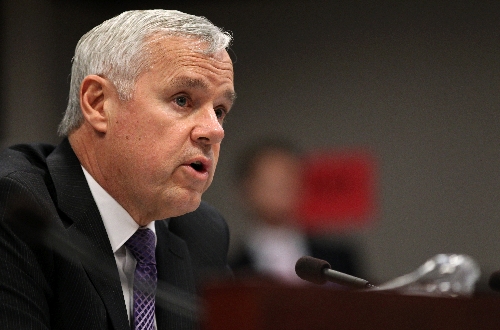Legislator warns of uprising over lack of community college funding

CARSON CITY — A state senator invoked the prospect of Egypt-style unrest in Las Vegas if the College of Southern Nevada can’t help more displaced construction workers get career education.
Sen. John Lee, D-North Las Vegas, said hopelessness over long-term unemployment and pent-up anger about a funding imbalance that favors universities over community colleges has unemployed construction workers and others who are seeking retraining at their wits’ end.
He called on a joint education subcommittee in the Legislature to take action before community sentiment turns ugly.
“We will have to do as they did in Egypt, fight for those rights,” Lee told the group, who didn’t respond other than to thank him for his testimony.
He wants the Legislature and the Nevada System of Higher Education to change funding formulas in order to shift funds to CSN and Truckee Meadows Community College.
“I hold the university Board of Regents responsible for this obvious discrimination,” Lee said of the per student funding disparity between community colleges and UNR and UNLV.
Chancellor Dan Klaich, who attended the hearing, said he agreed with Lee that “there is an equity issue that needs to be addressed.”
When asked if Lee’s Egypt analogy was hyperbole Klaich said, “He was more passionate than I might have been.”
Lee’s comments came during a hearing to study the higher education budgets.
Republican Gov. Brian Sandoval’s budget proposal would cut the system’s operating budget from the current level of $556 million to $395 million by 2013.
The budget proposes cutting state support for CSN from $91 million in the current year to $64 million by 2013, a difference of about 30 percent.
State support for University of Nevada, Las Vegas would fall from $146 million to $107 million, a difference of 27 percent and for the University of Nevada, Reno from $118 million to $81 million, a 31 percent decline.
However, Sandoval also proposes diverting a portion of property taxes in Clark and Washoe counties to UNLV and UNR, but not to the community colleges in those counties.
Andrew Clinger, Sandoval’s budget director, told the committee “we are certainly open” to including community colleges in the property tax diversion.
What Lee and others want, however, is a wholesale change to the complicated funding formula he and others say over the course of several years has shortchanged the community college by $20 million.
“That has been a problem for a long time, I’m really glad Senator Lee is talking about that,” said J.T. Creedon, student body president at CSN. “We get the least funding out of every college in the state.”
Klaich said he supports studying how best to change the formula after the 120-day legislative session concludes. The study recommendation could be the basis for a change during the 2013 session.
“I don’t know that it is possible to do it faster than this,” Klaich said.
Sen. Ben Kieckhefer, R-Reno, agreed the state needs to reform the way it distributes higher education money, but he was skeptical a major change could be done quickly.
“The system has been built up over 100 years; it is not a switch that you just flip,” he said.
Lee said he was motivated to speak out by the plight of working people in Las Vegas, where the official unemployment rate is near 15 percent and many construction workers have been jobless for months.
After leaving the hearing Lee said he recently closed a tile company he owned, putting 80 people out of work.
He said the repetitive stress of longtime tile work wears down workers’ bodies. The workers are able to repeat the process every day for years, but once they are out of work for several months it becomes difficult, or impossible, to go back to that type of labor, Lee said.
“You can’t get back on your knees,” Lee said. “Your body just doesn’t come back again.”
Workers in such a predicament need access to education and training to find new careers and avoid long-term dependence on social services, he said.
Las Vegas and other communities with large numbers of working-class unemployed are under stress and poised to lash out if more money is not set aside to improve educational opportunities, Lee said.
“It is the poorer classes doing what they need to move back into the middle class,” Lee said.
Contact reporter Benjamin Spillman at bspillman@reviewjournal.com or 702-477-3861.












